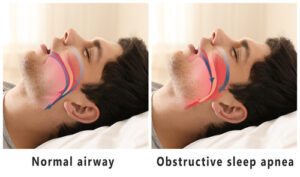
menu

Posted in Uncategorized | July 27, 2023

Do you feel groggy, tired, or sleepy when you wake up, even after getting a good night’s rest? Has your roommate or partner mentioned that you snore loudly or gasp for air while sleeping?
These are signs that you may have sleep apnea. Sleep apnea is a serious sleep disorder.
Left untreated, it can cause serious health complications like diabetes, high blood pressure, stroke, liver problems, heart disease, and even a shortened lifespan. If your doctor suspects you have sleep apnea, you may need to undergo a home sleep study.
A home sleep study is a powerful diagnostic tool for sleep apnea. Keep reading to learn more about sleep apnea, home sleep studies, and 7 advantages of undergoing a home sleep study.

Sleep apnea is a sleep disorder that causes you to stop breathing while sleeping. These short stops in breathing can lead to low oxygen levels.
The pauses in breathing typically occur 10 to 30 seconds at a time and may happen hundreds of times every night. Each time your breathing stops, your brain tries to protect you by having you jolt awake to resume breathing.
However, this prevents the body from reaching healthy, restorative REM sleep. Not getting REM sleep can result in serious health complications down the road.
There are different types of sleep apnea. The most common form is obstructive sleep apnea (OSA). Obstructive sleep apnea happens when the soft tissues in the back of your throat, like the soft palate and tongue, relax.
This partially or completely blocks your upper airway, temporarily preventing you from getting enough air.
Common signs and symptoms of sleep apnea include:

If your doctor suspects you have obstructive sleep apnea, they may ask you to take a home sleep study. A home sleep study is an effective, self-administered test to measure your breathing, heart rate, and airflow while you sleep.
For the test, you’ll set up equipment that gathers and records all the critical information during one or several nights. Your doctor will then diagnose or rule out obstructive sleep apnea using the data collected by the device.
Currently, a home sleep study can only be prescribed by your doctor if you have symptoms of obstructive sleep apnea.

A lab or in-clinic sleep study involves sleeping in a sleep center. While there, a technician will attach sensors to you at night and monitor your breathing and other vital signs while you sleep.
You’ll complete a home sleep study at your home. It uses different equipment you set up when you’re ready to sleep. The equipment tracks your physiological signs throughout the night.
Here are some of the reasons to consider a home sleep study.
You may find relaxing and falling asleep in a clinical, unfamiliar setting challenging, which can be the case for many people. Yet, sleep duration and quality of sleep are crucial in getting accurate results from a sleep study.
When you complete a home sleep study, you’ll sleep in your own bed. Feeling comfortable makes a significant difference when trying to get a good night’s sleep.
By sticking to your usual sleep routine, your test results from a home sleep study will have a better chance of being reliable.
Taking a home sleep study is more convenient, especially if the sleep center is far away from you or you have a busy schedule. All you need to do to take the test is connect the necessary monitors as instructed and sleep as usual.
You’ll usually have a home sleep study conducted over one or several nights. The study will record many of the same physiological signs as an in-clinic sleep study.
An in-home study is less expensive than an in-clinic study. While a home sleep study can cost several hundred dollars, going to a lab to complete a sleep study could cost thousands. A home sleep study is far more affordable if you have to pay for healthcare expenses out-of-pocket.
Home sleep testing uses about 2 to 5 sensors and wires. You’ll receive simple instructions to set up the test.
The sensors and wires take essential measurements while you sleep.
Compared to an in-lab study with around 20 to 25 sensors, a home sleep study is much easier for you to sleep with as it causes less interference and disturbance.
A sleep study done at home is just as reliable as a study carried out in a sleep center. An in-home sleep study will give your doctor accurate data to diagnose obstructive sleep apnea.
You may have to wait a few weeks before a bed becomes available for a sleep study performed at an in-clinic sleep facility. But with a home sleep study, you don’t have to wait.
You simply take it when it’s most convenient for you. The process is quick and straightforward, from setting up the device to getting your test results. This is especially important for patients with severe obstructive sleep apnea.
These patients can undergo their sleep study without delay, receive an accurate diagnosis fast, and begin treatment quickly.
For those who cannot easily leave their homes, like elderly adults, patients with chronic illnesses, or people with disabilities, going to a sleep center may not be an option. At home, these individuals can easily undergo a home sleep study with the aid of a caregiver.

Timely diagnosis and treatment of sleep apnea at Specialty Care Institute is crucial. It will help you find relief from the unpleasant symptoms of sleep apnea and prevent the long-term impact of the disorder.
Do you have signs of sleep apnea? Schedule your appointment today at Speciality Care Institute in Arlington Heights, Barrington, Elgin, or Hoffman Estates, IL, to find out if you could benefit from a home sleep study!